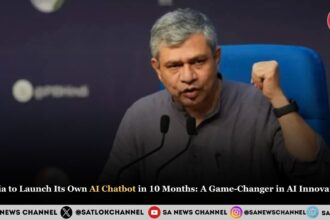Trapit Bansal, a prominent AI researcher and former member of OpenAI, has been hired by Meta with an astonishing signing bonus of ₹800 crore. Bansal, who hails from Uttar Pradesh, has become one of the highest-paid AI researchers globally. He will now contribute to Meta’s Superintelligence Lab, a newly launched division aiming to develop next-generation artificial general intelligence (AGI) systems.
Who Is Trapit Bansal?
Trapit Bansal is an Indian computer scientist and AI researcher. Born and raised in Uttar Pradesh, he completed his Bachelor’s in Mathematics and Computing from IIT Kanpur. Later, he moved to the United States to pursue higher education and earned a Master of Science and PhD in Computer Science from the University of Massachusetts Amherst.
His academic journey, marked by a strong foundation in mathematics and computing, laid the groundwork for his future in AI.
Career and Contributions
After completing his PhD, Bansal worked at Accenture and later with IISc Bengaluru. In 2022, he joined OpenAI as a Member of Technical Staff, where he collaborated closely with co-founder Ilya Sutskever.
One of his key contributions was to the internal development of the “o1” reasoning model, which is foundational to GPT‑4’s capabilities. His work on reasoning-first models helped shape more coherent and context-aware large language models (LLMs), earning him international recognition.
Why Meta Hired Trapit Bansal
Meta’s latest recruitment aligns with its aggressive strategy to dominate the future of AI. The company is investing heavily in reasoning-capable AGI models and isn’t hesitating to offer ₹1,000+ crore packages to secure top AI minds.
Bansal’s deep experience with internal reasoning models and alignment with AGI development made him a perfect fit. His transition to Meta signifies a “power move” as Meta aims to compete with OpenAI, Google DeepMind, and Anthropic.
Meta’s Superintelligence Lab: Vision and Direction
Meta’s Superintelligence Lab was recently formed to advance reasoning-first AI. The lab includes researchers from OpenAI, Apple, DeepMind, and Anthropic, all working to build models that can match or surpass human intelligence.
Hiring Trapit Bansal strengthens Meta’s initiative to create safer, smarter, and more contextually aware AI systems that could revolutionize how we interact with technology.
A Spiritual Perspective
While the world celebrates Trapit Bansal’s monumental achievement, a deeper truth must not be ignored:
Worldly success, fame, and wealth are fleeting.
True success is when God accepts you, not merely when society applauds you. In the race for material excellence, we often lose sight of our ultimate purpose: liberation from the cycle of birth and death.
Only a Tatavdarshi Saint Rampal Ji Maharaj Ji teaches that salvation is the highest achievement, and it is only possible through Naam-Diksha (initiation) from a Tatvadarshi Saint, coupled with scripture-based devotion.
No worldly gain can match the eternal peace and happiness one attains by walking the path shown by the Supreme God Kabir.
Frequently Asked Questions about Trapit Bansal
Q1. What was Trapit Bansal’s role at OpenAI?
A1: He contributed to the “o1” internal reasoning model used in GPT‑4, collaborating with OpenAI’s co-founder.
Q2. What is Meta’s Superintelligence Lab?
A2: A new division focused on building AI systems that demonstrate human-like or superior reasoning capabilities.
Q3. Are ₹800+ crore AI packages common now?
A3: In top-tier AI recruiting, yes. Meta, Apple, and Anthropic offer ₹500–₹1600 crore to secure exceptional researchers.
Q4. Will Bansal work from India or abroad?
A4: Most likely from Meta’s US research hubs, though the company also has growing teams in London and Bengaluru.
Q5. Did Trapit approach Meta or was he headhunted?
A5: Reports suggest he was approached. Top AI companies track global talent and offer directly when value is proven.









